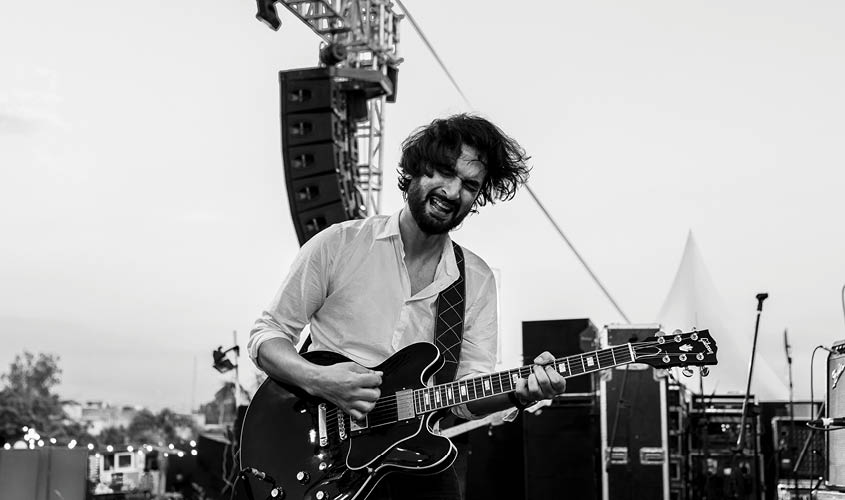Khalid Ahamed, lead vocalist of Bangalore-based Rock band Parvaaz, talks about his journey from Kashmir Valley to the cover of ‘Rolling Stone India’ and how music has its own language that often transcends human barriers.
Khalid Ahamed is the lead vocalist of Parvaaz, an independent Bangalore-based Rock band setup in 2010. He has led the band to perform in not just major Indian cities like Delhi, Mumbai, Bangalore and Ahmedabad, but also global hotspots like Dubai and Toronto. Parvaaz includes, besides Khalid, Mir Kashif Iqbal (guitar), Fidel Dsouza (bass) and Sachin Banandur (drums and percussion). Apart from the notable singles such as ‘Khufiya Dastaan’ (2013), ‘Shaad’ (2017) and ‘Color White’ (2017), the band has come out with several albums including ‘Behosh – EP’ (2012), ‘Baran’ (2014), ‘Transitions’ (2016) and ‘Kun’ (2019). Even its song ‘Beparwah’ was used in a Bollywood film, Vodka Diaries. In December 2016 Parvaaz got featured in Rolling Stone India’s 2016 hot list and was on the cover of the same magazine in May 2018. Excerpts of Khalid in conversation with G20:
Q. Most of the bands or the ideas start right from their college days! Was it the case with you too?
A. Yes, absolutely. It began during the college days. I and Kashif would sit together and jam for hours. That’s how we came up with Parvaaz. I guess that’s the case with most other bands too.
Q. How were you introduced to music?
A. I’d say I got introduced to music through TV and tapes. There was this place in Srinagar called AUDIOMART where I would get the cassettes and play them on my tape. That’s how I got into non-commercial, or to be precise non-Bollywood, songs during my school days. It was a privilege to listen to international bands and other independent artists from all around the world.

Q. Who is your go-to vocalist? Seeing you hitting those high notes gives a hint that you’ve been following vocalists like Freddie Mercury and Robert Plant. How do you sing those high notes?
A. Absolutely, I love
Q. How do you write and compose songs? Let’s talk about ‘Soye Jaa’ from ‘Kun’…
A. Well, our songwriting process is mostly melodic in approach. That is, usually, the melody comes first, then the lyrics and the further arrangement. For example, ‘Soye Jaa’ was initially the acoustic and bass song, but when Kashif, Sachin and Fidel contributed their elements, we had to arrange the melody accordingly. Otherwise, ‘Soye Jaa’ was composed much earlier than the other tracks of our album.
Q. If you have to choose one singer/songwriter from Kashmir Valley, who would he/she be?
A. There is not any specific favourite. But to name a few, who are doing great in the scene: Ali Saffudin and Muhammad Muneem.
Q. Tell us top three songs you have sung for the band.
A. Well, it depends. Sometimes I like a song which my bandmates will not like to that extent. And even, my favourites keep changing. ‘Roz Roz’, ‘Katyi Rov’, ‘Soye Jaa’ and ‘Gul Gulshan’ are the few songs that are close to me. Another song which I would add to the list of my favourites is ‘Fitnah’.
Q. What is the advice you would like to give to a budding singer/songwriter?
A. First, believe in yourself. Second, the more you are musically involved, the more you learn. If you are stuck, you are done and dusted. Learning curve should slant upwards; that is important. There is a concept of dexterity, which is, you learn more by doing more.
Q. Why do you think carrying on the legacy of Classic Rock is relevant nowadays?
A. I would say every genre, whether it be Blues, Rock or Electornic, has its own space and audience. There are people who still listen to Floyd and Zepplin. We grew up listening to that sort of music and we feel connected to it and that’s why we are sticking to this kind of music only. And moreover, we don’t experiment much. Guitar, bass and drums are most of the times enough.
Q. How do people, especially in Bangalore, receive your songs which are written in Urdu, Hindi and Kashmiri?
A. People in Bangalore are very warm and appreciative of art. They have enjoyed our music and have given us overwhelming response. For instance, a few years ago, we went to Delhi and we were performing songs from ‘Baran’, our first LP. To our surprise, people started chanting all our songs, even the Kashmiri ones. Music has its own language, which is universal in nature and transcends the frontiers of human communication.

